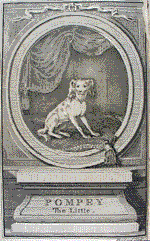Francis Coventry
Francis Coventry (* mid-July 1725 in Mill End , Buckinghamshire , † January 1754 in Edgware , Middlesex ) was an English writer and cleric . Coventry was best known for The History of Pompey the Little, published in 1751 ; or, The Life and Adventures of a Lap-Dog , a satire that caricatured English society of its era from the perspective of a lap dog .
Life
Francis Coventry was born William Francis Walter Coventry in Mills End, Buckinghamshire, in 1725 to the wealthy merchant and landowner Thomas Coventry and his second wife Gratia-Anna-Maria Brown, the daughter of a priest. In addition, Francis was the nephew of William, the 5th Earl of Coventry (1676-1751). With almost certainty, Francis Coventry enjoyed private training with tutors before he studied in Eton (1742-1744) and at Magdalen College , Cambridge , from 1746. There he earned his bachelor's degree in 1749 . In Cambridge, Coventry met the poet Thomas Gray and presented him with a comedy that has not been handed down, which was to provide the basis for Pompey the Little .
Coventry's first publication was a poem entitled Penshurst ( 1750 ) in the manner of an early Ben Jonson poem of the same title. Both poems described Penshurst Palace, home of Sir Philip Sidney . In Cambridge, Francis Coventry wrote much of his later widely acclaimed work The History of Pompey the Little , a humorous satire on London society from the perspective of a lapdog. However, Francis Coventry also caricatured the behavior of those dog owners who would generally raise the personality of the dog above that of humans. The work saw three editions during Coventry's lifetime and was popular with the public. By 1800 there were already eight authorized editions. Johann Friedrich Jünger also translated this successful English title from the mid-1750s over 30 years later under the title The Little Caesar for the first time directly into German . There is an earlier German version, but it was based on a French translation of the original by François-Vincent Toussaint from 1752 , which had already been edited .
In addition, Coventry published essays in his short life , An Essay on the New Species of Writing Founded by Mr. Fielding. (1751) and Essay on the English garden, in the cultural magazine The World (1753). Fielding himself acts as editor of the work of his cousin Henry Coventry , Philemon to Hydaspes: or, The history of false religion in the earliest pagan world: related in a series of conversationsm (1753).
Francis Coventry became a cleric of the Church of England in 1751 and served as curator of the parish in Edgware , Middlesex . In 1752 he obtained his MA in Cambridge. Coventry died of complications from smallpox at the age of 28 .
Works
Poems:
- Penshurst. Robert Dodsley, Cambridge 1750.
- Inscription for an Oak in Penshurst Park . approx. 1750; In: Gentleman's Magazine no.April 30, 1761, p. 184.
Novel:
- The History of Pompey the Little, or the Life and Adventures of a Lap-Dog . Mary Cooper, London 1751.
-
The History of Pompey the Little: or, The Life and Adventures of a Lap-dog. Edited by Robert Adams Day, Oxford University Press, London / New York 1974.
- German The Little Caesar. Based on the English of Coventry. Translated from English by Johann Friedrich Jünger. Dykische Buchhandlung, Leipzig 1782.
Essays:
- An Essay on the New Species of Writing Founded by Mr. Fielding . 1751.
- Essay on the English Garden. In: The World . Robert Dodsley, London 1753.
Editing:
- Henry Coventry : Philemon to Hydaspes . 1753.
Web links
- The History of Pompey the Little, or the Life and Adventures of a Lap-Dog Full text of the 3rd edition. 1752, * .html.
- Podcast on Librivox
Individual evidence
- ^ Alan Hager (Ed.): Encyclopedia of British Writers. Facts on File, New York 2005, p. 70. ISBN 978-1-4381-0869-8 .
- ↑ a b c Gale Cengage: Francis Coventry . In: Literary Criticism (1400-1800). Vol. 46. Dale, Detroit 1999. ( Page no longer available , search in web archives ) Info: The link was automatically marked as defective. Please check the link according to the instructions and then remove this notice. On: www.enotes.com. Accessed October 30, 2012.
- ^ Alan Hager (Ed.): Encyclopedia of British Writers. Facts on File, New York 2005, p. 71.
| personal data | |
|---|---|
| SURNAME | Coventry, Francis |
| ALTERNATIVE NAMES | Coventry, William Francis Walter |
| BRIEF DESCRIPTION | English writer |
| DATE OF BIRTH | between July 10, 1725 and July 20, 1725 |
| PLACE OF BIRTH | Mill End , Buckinghamshire |
| DATE OF DEATH | January 1754 |
| Place of death | Edgware , Middlesex |
